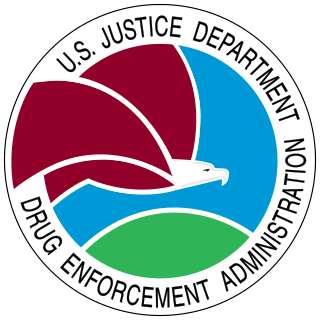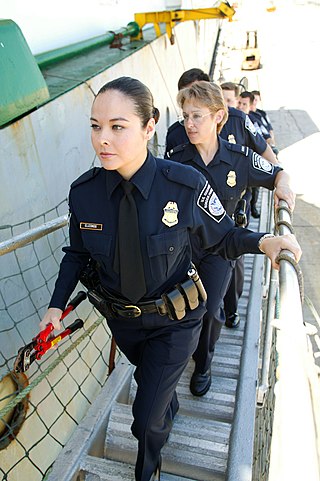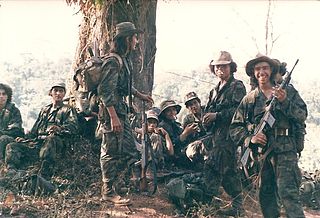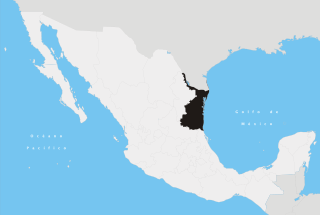Related Research Articles

The United States Marshals Service (USMS) is a federal law enforcement agency in the United States. The Marshals Service serves as the enforcement and security arm of the U.S. federal judiciary, although it is an agency of the U.S. Department of Justice and operates under the direction of the U.S. Attorney General. It is the oldest U.S. federal law enforcement agency, created by the Judiciary Act of 1789 during the presidency of George Washington as the "Office of the United States Marshal". The USMS as it stands today was established in 1969 to provide guidance and assistance to U.S. Marshals throughout the federal judicial districts.

The Drug Enforcement Administration (DEA) is a United States federal law enforcement agency under the U.S. Department of Justice tasked with combating illicit drug trafficking and distribution within the U.S. It is the lead agency for domestic enforcement of the Controlled Substances Act, sharing concurrent jurisdiction with the Federal Bureau of Investigation, the U.S. Immigration and Customs Enforcement, and U.S. Customs and Border Protection. However, the DEA has sole responsibility for coordinating and pursuing U.S. drug investigations both domestically and internationally.
In the United States, a special agent is an official title used to refer to certain investigators or detectives of federal, military, tribal, or state agencies who primarily serve in criminal investigatory positions. Additionally, some special agents operate in criminal intelligence, counterterrorism, or counterintelligence-based roles as well, with one or all of these roles occasionally taking precedence over criminal investigatory tasks.

Thomas A. Constantine served as the 6th Administrator of the Drug Enforcement Administration (DEA) from March 1994 to July 1999.

The Campaign Against Marijuana Planting (CAMP) is a multi-agency law enforcement task force managed by the California Department of Justice and composed of local, state and federal agencies organized expressly to eradicate illegal cannabis cultivation and trafficking in California. Since its establishment in 1983, more than 110 agencies having participated, making CAMP one of the largest law enforcement task force in the United States.

The Bureau of International Narcotics and Law Enforcement Affairs (INL) is an agency that reports to the Under Secretary for Civilian Security, Democracy, and Human Rights within the United States Department of State. Under the umbrella of its general mission of developing policies and programs to combat international narcotics and crime, INL plays an important role in the training of partner nation security forces.

The United States Central Intelligence Agency (CIA) has been accused of involvement in the trafficking of illicit drugs. Books and journalistic investigations on the subject that have received general notice include works by the historian Alfred McCoy, professor and diplomat Peter Dale Scott, journalists Gary Webb and Alexander Cockburn, and writer Larry Collins. These claims have led to investigations by the United States government, including hearings and reports by the United States House of Representatives, Senate, Department of Justice, and the CIA's Inspector General. The various investigations have generally not led to clear conclusions that the CIA itself has directly conducted drug trafficking operations, although there may have been instances of indirect complicity in the activities of others.
Juan Ramón Matta-Ballesteros is a Honduran former major narcotics trafficker who has been credited with being one of the first to connect Mexican drug traffickers with the Colombian cocaine cartels. This connection paved the way for a major increase in the amount of cocaine smuggled into the United States during the late 1970s and throughout the 1980s. Matta was indicted for operating several major cocaine smuggling rings in United States in the early 1980s. He was also one of the narcotics traffickers accused of the kidnap and murder of American DEA agent Enrique Camarena in 1985.

The Organized Crime Drug Enforcement Task Force (OCDETF) is a federal drug enforcement program in the United States, overseen by the Attorney General and the Department of Justice. The principal mission of the OCDETF program is to identify, disrupt, and dismantle the major drug trafficking operations and tackle related crimes, such as money laundering, tax and weapon violations, and violent crime, and prosecute those primarily responsible for the nation's drug supply.

The federal government of the United States empowers a wide range of federal law enforcement agencies to maintain law and public order related to matters affecting the country as a whole.

CIA activities in Nicaragua were frequent in the late 20th century. The increasing influence gained by the Sandinista National Liberation Front, a left-wing and anti-imperialist political party in Nicaragua, led to a sharp decrease in Nicaragua–United States relations, particularly after the Nicaraguan Revolution. In 1981, President Ronald Reagan authorized the Central Intelligence Agency to support the Contras, a right-wing Nicaraguan political group to combat the influence held by the Sandinistas in the Nicaraguan government. Various anti-government rebels in Nicaragua were organized into the Nicaraguan Democratic Force, the first Contra group, at the behest of the CIA. The CIA also supplied the Contras with training and equipment, including materials related to torture and assassination. There have also been allegations that the CIA engaged in drug trafficking in Nicaragua.

The California Department of Justice is a statewide investigative law enforcement agency and legal department of the California executive branch under the elected leadership of the Attorney General of California (AG) which carries out complex criminal and civil investigations, prosecutions, and other legal services throughout the US State of California. The department is equivalent to the state bureaus of investigation in other states.
Project Gunrunner is a project of the U.S. Bureau of Alcohol, Tobacco, Firearms and Explosives (ATF) intended to stem the flow of firearms into Mexico, in an attempt to deprive the Mexican drug cartels of weapons.
Illegal drug trade in Venezuela is the practice of illegal drug trading in Venezuela. Venezuela has been a path to the United States for cocaine originating in Colombia, through Central America and Mexico and Caribbean countries such as Haiti, the Dominican Republic, and Puerto Rico. In the 2010s, Venezuela also gradually became a major producer of cocaine.

Gunwalking, or "letting guns walk", was a tactic used by the Arizona U.S. Attorney's Office and the Arizona Field Office of the United States Bureau of Alcohol, Tobacco, Firearms and Explosives (ATF), which ran a series of sting operations between 2006 and 2011 in the Tucson and Phoenix area where the ATF "purposely allowed licensed firearms dealers to sell weapons to illegal straw buyers, hoping to track the guns to Mexican drug cartel leaders and arrest them" - however as of October 2011, none of the targeted high-level cartel figures had been arrested. These operations were done under the umbrella of Project Gunrunner, a project intended to stem the flow of firearms into Mexico by interdicting straw purchasers and gun traffickers within the United States. The Jacob Chambers Case began in October 2009 and eventually became known in February 2010 as Operation Fast and Furious after agents discovered Chambers and the other suspects under investigation belonged to a car club.

Enrique "Kiki" Camarena Salazar was an American intelligence officer for the Drug Enforcement Administration (DEA). In February 1985, Camarena was kidnapped by drug traffickers hired by Mexican politicians in Guadalajara, Mexico. He was interrogated under torture and murdered. Three leaders of the Guadalajara drug cartel were eventually convicted in Mexico for Camarena's murder. The U.S. investigation into Camarena's murder led to ten more trials in Los Angeles for other Mexican nationals involved in the crime. The case continues to trouble U.S.–Mexican relations, most recently when Rafael Caro Quintero, one of the three convicted traffickers, was released from a Mexican prison in 2013. Caro Quintero again was captured by Mexican forces in July 2022.
The incarceration of Daniel Chong was an incident in April 2012 in San Diego, California, when agents from the U.S. Drug Enforcement Administration (DEA) left a detained student locked in a holding room for five days. The cell contained no food, water or bathroom facilities. When he was found, he had to be hospitalized for several days for a variety of medical problems. The incident touched off a national furor, resulting in several investigations. The incident has been described as a "Kafkaesque nightmare," a "debacle," and "one of the worst cases of its kind."

The Narcosobrinos affair is the situation of events that surrounded two nephews of Venezuelan President Nicolás Maduro and his wife Cilia Flores who were arrested for narcotics trafficking. The nephews, Efraín Antonio Campo Flores and Francisco Flores de Freitas, were arrested on 10 November 2015 by the United States Drug Enforcement Administration in Port-au-Prince, Haiti after attempting to transport 800 kilograms of cocaine into the United States. A year later on 18 November 2016, the two nephews were found guilty, with the cash allegedly destined to "help their family stay in power". On 14 December 2017, the two were sentenced to 18 years of imprisonment.

William J. Walker is a retired United States Army major general and former Sergeant at Arms of the U.S. House of Representatives. He was the 38th House Sergeant at Arms and the first African-American to hold the office. He last served as the 23rd Commanding General of the District of Columbia National Guard. This responsibility includes command of the District of Columbia Army and Air National Guard units. Walker previously served in the Drug Enforcement Administration as a Special Agent and was promoted to the Senior Executive Service in January 2003, with his final assignment being Deputy Assistant Administrator in Charge of the Office of Strategic Warning Intelligence. Walker is a member of the Council on Foreign Relations and a National Academy of Public Administration Fellow.

On 9 November 1999, two agents from the United States Drug Enforcement Administration (DEA) and Federal Bureau of Investigation (FBI) were threatened at gunpoint and nearly killed in Matamoros, Tamaulipas, Mexico, by gunmen of the Gulf Cartel, a criminal group based in the area. The two agents traveled to Matamoros with an informant to gather intelligence on the operations of the Gulf Cartel. As they cruised through one of the properties owned by the criminal group, they noticed several vehicles following them. The agents were forced to a stop and were corralled by a convoy of eight vehicles, from which fifteen gunmen emerged and surrounded the agents' car. Some of them wore uniforms of the local police. Among the gunmen was the former kingpin Osiel Cárdenas Guillén, who recognized the informant and ordered the three of them to get out of their vehicle.
References
- 1 2 3 4 5 6 A Special Joint Review of Post-Incident Responses by the Department of State and Drug Enforcement Administration to Three Deadly Force Incidents in Honduras (PDF) (Report). May 2017. p. 424. Retrieved 25 May 2017– via Office of the Inspectors General, U.S. Department of Justice, U.S. Department of State.
- ↑ Mariano Castillo (12 July 2012). "Behind deadly confrontations in Honduras, a new anti-drug strategy". CNN . Retrieved 16 July 2012.
- ↑ "Victims caught in Honduras drugs crossfire". BBC. 16 July 2012. Retrieved 16 July 2012.
- ↑ Gamboa, Suzanne (24 May 2017). "DEA Misled Congress on Deadly Shootings in Honduras Drug Operations". NBC News . Retrieved 25 May 2017.